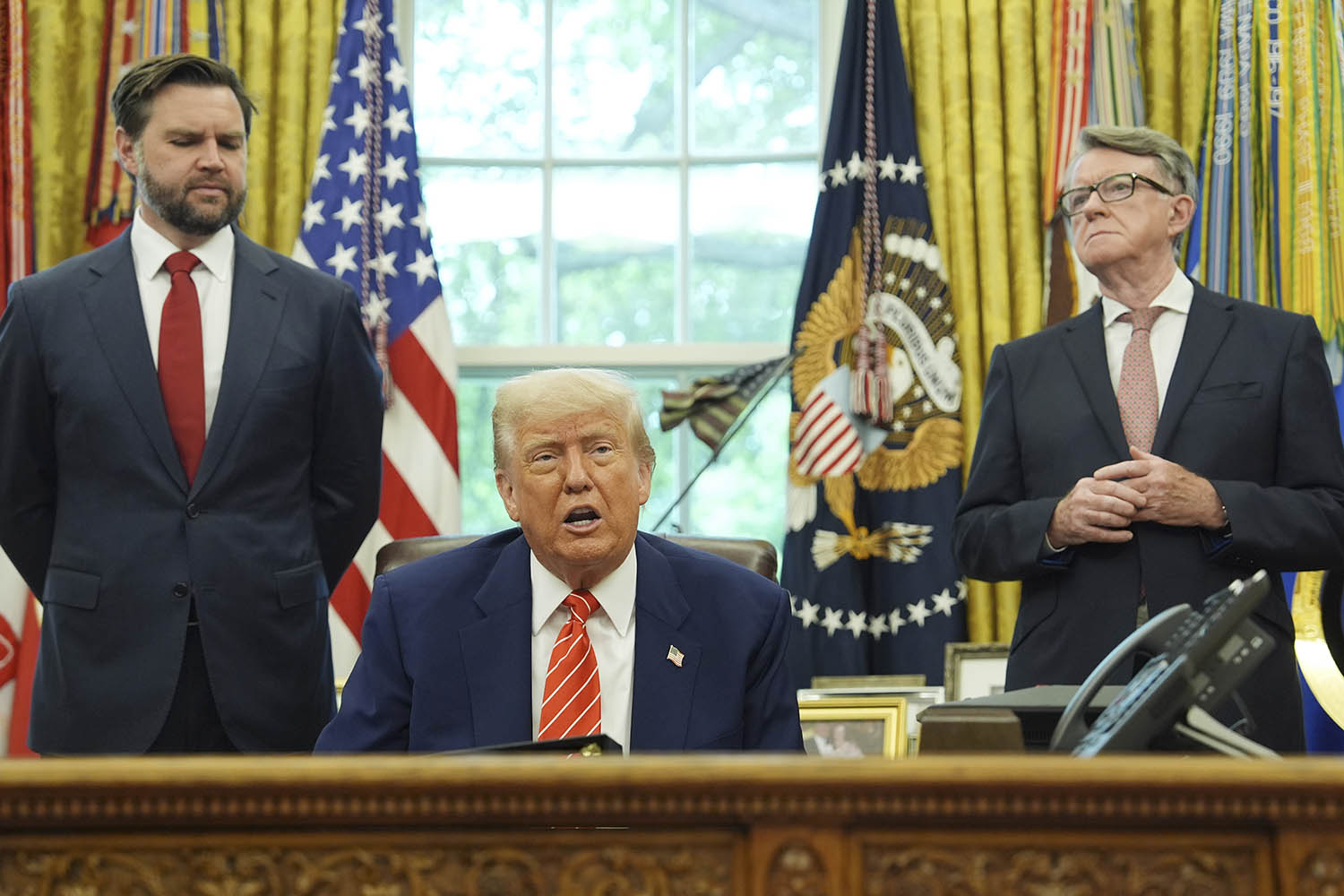You wait ages for a deal and then three come along at once. On VE Day, Sir Keir Starmer and Donald Trump staged a televised conference call to announce an agreement which will spare our car, steel and aluminium industries from the most savage of the Trumpian import levies, making the UK the first country to win something of a reprieve from the US president’s tariffs craze. Two days earlier, we saw the proclamation of a trade deal with India which has been three years in the works. The moment with most potential significance comes on 19 May when EU leaders will be in London for a summit designed to advance the UK’s rapprochement with its closest neighbours.
None of which is likely to have any immediate impact on the government’s dismal approval ratings. But if Downing Street has its way, this period will be remembered not so much for the drubbing meted out to Labour at the local elections as for a triple-whammy of beneficial international bargains brokered by Sir Keir’s government.
Kemi Badenoch has tried to deny him that palm. “Keir Starmer called this historic,” snapped the Tory leader in response to the US agreement, before mustering the states-womanly observation: “It’s not historic, we’ve just been shafted!” Her rhetoric is puerile and she might have a word with Andrew Griffith, her shadow trade secretary, who said that the agreement “will be welcomed by exporting businesses”.
There’s no question that this deal leaves Britain worse off than it would have been had Americans decided to send Kamala Harris to the White House. The prime minister conceded as much, telling journalists that what mattered was whether things had improved compared with “yesterday” rather than three months ago. The optimal outcome of the tricky negotiations with a haphazard White House would have been no Trumpian tariffs at all. That not being available from Trumpworld, the British team concentrated on protecting the most vulnerable sectors. UK vehicle manufacturers will be able to export up to 100,000 cars a year to the US at a tariff of 10%, much more manageable than the 25% originally threatened. The swingeing imposts on aluminium and steel exports have been flattened to zero, a huge relief to ministers trying to save those industries. “Significant preferential treatment” for pharmaceuticals, a big exporter to the US and a big employer in the UK, is another advantage. Some modest concessions on agricultural products have protected tens of thousands of jobs in critical industries. The unctuous invite to Mr Trump to make a second state visit probably sticks in your craw as much as it does in mine, but obliging King Charles to take one for the team will be a price worth paying for the livelihoods that have been saved.
After months of being ridiculed for his wooing of the capricious US president, Sir Keir can claim a dividend for his keep-calm-and-suck-up strategy. On top of which, he’s not conceded a dilution of the digital services tax, which is predominantly paid by US tech behemoths. That’s very welcome to ministers who were not looking forward to justifying tax breaks for US billionaires while simultaneously defending cuts to incapacity benefits in the name of balancing the books.
The India deal aligns the UK more closely with the world’s most populous country and one of the fastest-expanding major economies. There will be cuts to duties on more than 90% of export goods. Scottish distillers and Indian whisky-drinkers will be raising a glass. Having failed to land this agreement while they were in office, the Tories have been reduced to hollow carping about granting relief from national insurance contributions to employees of Indian companies so that they are not double-taxed while seconded to the UK. Mrs Badenoch, once trade minister herself, ought to be aware that this practice is so extremely common that it is a feature of our existing agreements with about 50 other countries.
Having done my best to see the gains, we must now get to the cautions. Sir Keir boasted that the US deal is “fantastic”. As he surely knows, it is not. The agreement merely mitigates the worst of the damage threatened on “Liberation Day”. The bargain struck with India is a more authentic advance, but only expected to boost the UK’s long-term growth by 0.1% of GDP a year. By 2040. That is not going to be transformative of either the British economy or Labour’s chances of getting re-elected.
The agreement with the US merely mitigates the worst of the damage threatened on ‘Liberation Day’
The agreement with the US merely mitigates the worst of the damage threatened on ‘Liberation Day’
By far the greatest boost to growth would come from reducing the frictions in the commerce with our closest neighbours. Decent estimates reckon that Brexit has cost us 4% of GDP, equivalent to around £100bn in today’s money. Were the economy to be that much stronger, Rachel Reeves could spread sweetness and light among restive Labour MPs by instantly restoring the winter fuel payment to every pensioner and the Treasury would have lots of spare moolah left over to put into public services. Both the UK and the EU are challenged by anaemic growth, as they are also mutually menaced by Vladimir Putin to the east and Donald Trump to the west. It is in their joint interests to boost prosperity through increased trade and investment.
Polling tells us that Britons favour prioritising the improvement of relations with the rest of Europe. Even among Reform voters, a hefty majority want the government to remove trade barriers between the UK and the EU. Sir Keir tells his inner circle that the UK is being taken seriously in Europe in a way that it has not been for a decade. There’s truth in that, but there’s still a lot of sluggishness about pursuing concrete results. The London summit will put signatures on a defence and security pact, paving the way for the UK’s participation in EU-supported military funds. On trade, the best to be expected is a “road map” for future talks. Charles Grant, director of the Centre for European Reform, argues in a forthcoming paper that the Starmer government’s “ambitions are limited, which gave the EU an excuse to lower its own ambitions”. Both sides need to be much more creative and flexible about fashioning an agenda that promotes growth in the EU and the UK. Rebuilding that relationship is the real test of whether Sir Keir has mastered the art of the deal.
Photograph by Evan Vucci/AP
Newsletters
Choose the newsletters you want to receive
View more
For information about how The Observer protects your data, read our Privacy Policy

